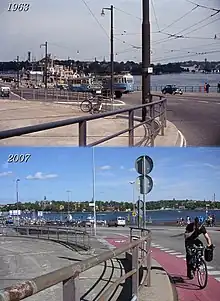Transport in Sweden
Transportation in Sweden is carried out by car, bus, train, tram, boat or aeroplane.
Railways in Sweden
Rail transport is operated by SJ, DSBFirst, Green Cargo, Vy Tåg and more. Most counties have companies that do ticketing, marketing and financing of local passenger rail, but the actual operation are done by the above-mentioned companies.
- Total: 11,663 km (includes 3,594 km of privately (in fact county) owned railways) or 9227 km of national railways
- standard gauge: 11,568 km 1,435 mm (4 ft 8+1⁄2 in) gauge (7,531 km electrified and 1,152 km double track) (2008)
- narrow gauge: 65 km of 891 mm (2 ft 11+3⁄32 in) gauge (2008)
- Trains generally keep to the left, as opposed to all neighbouring countries.
Light rail and metros
Stockholm Metro (Stockholms Tunnelbana) is the only metro system in Sweden.
Cities with light rail (trams);
- Gothenburg: Gothenburg tram – consisting of 190 km on a total track length of 161 km
- Norrköping: Norrköping tramway – small but growing
- Stockholm: Tvärbanan, Nockebybanan, Lidingöbanan, Spårväg City
- Lund – Lund tramway
Stockholm previously had a large tram network, but this was discontinued in favour of bus and metro; a revival of the tram network was seen in the construction of Tvärbanan in the late 1990s and early 2000s.
Railway links with adjacent countries
 Norway at Kornsjø (Gothenburg-Oslo), Charlottenberg/Eda (Stockholm-Oslo), Storlien (Östersund-Trondheim, not electrified Storlien-Trondheim) and Riksgränsen (Narvik-Kiruna)
Norway at Kornsjø (Gothenburg-Oslo), Charlottenberg/Eda (Stockholm-Oslo), Storlien (Östersund-Trondheim, not electrified Storlien-Trondheim) and Riksgränsen (Narvik-Kiruna)
- same gauge – same voltage – same protection system. Most Swedish and Norwegian rail vehicles can cross the border. As there is only single-track at all border crossings, there is no need for bridges to make the transition from left- to right-hand traffic.
 Finland at Tornio/Haparanda
Finland at Tornio/Haparanda
- break-of-gauge 1,435 mm (4 ft 8+1⁄2 in)/1,524 mm (5 ft) – other protection system. All freight has to be reloaded. No passenger traffic by rail.
 Denmark at Öresund bridge
Denmark at Öresund bridge
Road traffic

Sweden has right-hand traffic today like all its neighbours.
Sweden had left-hand traffic (Vänstertrafik in Swedish) from approximately 1736 and continued to do so until 1967. Despite this virtually all cars in Sweden were actually left-hand drive and the neighbouring Nordic countries already drove on the right, leading to mistakes by visitors. The Swedish voters rejected a change to driving on the right in a referendum held in 1955.
Nevertheless, in 1963 the Riksdag passed legislation ordering the switch to right-hand traffic. The changeover took place on a Sunday morning at 5am on September 3, 1967, which was known in Swedish as Dagen H (H-Day), the 'H' standing for Högertrafik or right-hand traffic.
Since Swedish cars were left-hand drive, experts had suggested that changing to driving on the right would reduce accidents, because drivers would have a better view of the road ahead. Indeed, fatal car-to-car and car-to-pedestrian accidents did drop sharply as a result. This was likely due to drivers initially being more careful and because of the initially very low speed limits, since accident rates soon returned to nearly the same as earlier.
Total roadways: 572,900 km, as of 2009.
Motorways
Motorways run through Sweden, Denmark and over the Öresund Bridge to Stockholm, Gothenburg, Uppsala and Uddevalla. The system of motorways is still being extended. The longest continuous motorways are Värnamo-Gävle (E4; 585 km) and Norwegian border - Vellinge (E6; 482 km; as the motorway between Trelleborg and Oslo in Norway has been completed in 2015).
Ports and harbours
- Gothenburg
- Gävle
- Halmstad
- Helsingborg
- Hudiksvall
- Kalmar
- Kapellskär
- Karlshamn
- Karlskrona
- Lidköping
- Malmö
- Norrköping
- Nynäshamn
- Stockholm
- Sundsvall
- Sölvesborg
- Trelleborg
- Varberg
- Västerås
- Waterways: 2,052 km (2010)
- note: navigable for small steamers and barges
Merchant marine
- total: 135 ships (1,000 gross tonnage (GT) or over) totaling 2,205,370 GT/1,663,091 tonnes deadweight (DWT)
- ships by type: (2010)
- bulk carrier 4
- cargo ship 26
- carrier 1
- chemical tanker 15
- passenger 5
- passenger/cargo 36
- petroleum tanker 11
- roll-on/roll-off 30
- vehicle carrier 17
Airports
- 230 (2012)
Airports with paved runways
(Official figures. A great number of wartime airfields exist with various lengths, usually built into roads, and are usually less than 1000 m long)
- total: 149
- over 3,047 m: 3 (Arlanda, Landvetter, Luleå)
- 2,438 to 3,047 m: 12
- 1,524 to 2,437 m: 74
- 914 to 1,523 m: 23
- under 914 m: 37 (2012)
Airports with unpaved runways
- total: 81
- 914 to 1,523 m: 5
- under 914 m: 76 (2012)
- Heliports
- 2 (2012) (Every hospital, airport and military base has Helipads.)
See also
References
- CIA World Factbook 2010
External links
![]() Media related to Transport in Sweden at Wikimedia Commons
Media related to Transport in Sweden at Wikimedia Commons